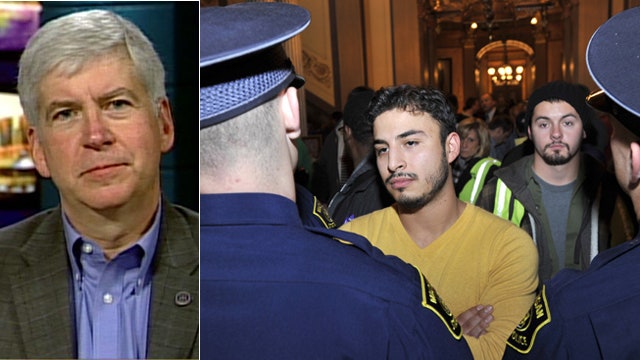Michigan Republicans touched off a firestorm Thursday with an abrupt push to pass right-to-work legislation, in what would be a blow to organized labor in the home of the U.S. auto industry.
Right-to-work legislation prohibits unions from forcing workers to pay union dues. Unions and their Democratic allies adamantly oppose these laws -- but with little warning, Michigan Republicans on Thursday laid the groundwork to, in a matter of days, make their state the 24th with right-to-work legislation.
Just hours after the bills were introduced, both Republican-controlled chambers approved measures prohibiting private unions from requiring dues. The Senate quickly followed by voting to impose the same requirement on most public unions.
"This is all about taking care of the hard-working workers in Michigan, being pro-worker and giving them freedom to make choices," Michigan Gov. Rick Snyder said. "The goal isn't to divide Michigan, it is to bring Michigan together."
Because of rules requiring a five-day delay between votes in the two chambers on the same legislation, final enactment could not take place until Tuesday.
Many labor groups were gearing up over the weekend for mass rally in Lansing when legislators return to session.
Snyder, who previously had said repeatedly that right-to-work was "not on my agenda," says he will sign the measures.
A few dozen people protesting the legislation inside the Lansing building housing Snyder's office on Friday afternoon were met by security guards and state police.
Protesters briefly met with representatives from Snyder's staff before leaving the building. They continued chanting outdoors and then disbanded.
No arrests were made.
The votes Thursday, though, drew hundreds of union-tied protesters to the capital, some of whom were pepper-sprayed by police when they tried to storm the Senate chamber.
Democrats denounced the bills as an attack on worker rights, but the GOP sponsor insisted they would boost the economy and jobs. A House vote on public-sector unions was expected to come later.
A victory in Michigan would give the right-to-work movement its strongest foothold yet in the Rust Belt region, where organized labor already has suffered several body blows. Republicans in Indiana and Wisconsin recently pushed through legislation curbing union rights, sparking massive protests.
United Auto Workers President Bob King said the defeats have had the effect of uniting the labor movement. He contends unions have never come together so strongly and he sees opportunity in crisis.
Labor expert Art Schwartz said the right-to-work issue galvanizes union leaders and many members. But their concerns will need to convince their nonunion neighbors for them to gain traction.
Protests against the legislation were being planned across the state throughout the weekend and a civil disobedience training session was scheduled for Saturday at a union local in Dearborn.
Even before the Michigan bills turned up Thursday, protesters streamed inside the Capitol preparing for what appeared inevitable after Snyder, House Speaker Jase Bolger and Senate Minority Leader Randy Richardville announced at a news conference they were putting the issue on a fast track.
Eight people were arrested Thursday for resisting and obstructing when they tried to push past two troopers guarding the Senate door at the Capitol, which was temporarily closed because of safety concerns.
The decision to push forward in the waning days of the Legislature's lame-duck session infuriated outnumbered Democrats, who resorted to parliamentary maneuvers to slow action but were powerless to block the bills.
House Democrats did walk out briefly Thursday in protest of the Capitol being closed.
Through a spokesman, President Obama also reiterated his opposition to right-to-work laws.
White House spokesman Matt Lehrich said Obama believes the economy "is stronger when workers get good wages and good benefits, and he opposes attempts to roll back their rights."
Lehrich said Michigan workers' role in helping reviving the U.S. auto industry shows "how unions have helped build a strong middle class and a strong American economy."
Adamczyk estimated that about 2,500 visitors were inside the Capitol, where their shouts reverberated off stone halls and frequently could be heard inside the ornate chambers.
After repeatedly insisting during his first two years in office that right-to-work was not on his agenda, Snyder reversed course Thursday, a month after voters defeated a ballot initiative that would have barred such measures under the state constitution.
In an interview with The Associated Press, Snyder said he had kept the issue at arm's length while pursuing other programs to bolster the state economy. But he said circumstances had pushed the matter to the forefront.
"It is a divisive issue," he acknowledged. "But it was already being divisive over the past few weeks, so let's get this resolved. Let's reach a conclusion that's in the best interests of all."
Also influencing his decision, he said, were reports that some 90 companies had decided to locate in Indiana since that state adopted right-to-work legislation. "That's thousands of jobs, and we want to have that kind of success in Michigan," he said.
Snyder and the GOP leaders insisted the legislation was not meant to weaken unions or collective bargaining, saying it would make unions more responsive to their members.
Senate Democratic leader Gretchen Whitmer said she was "livid."
Republicans have commanding majorities in both chambers -- 64-46 in the House and 26-12 in the Senate. Under their rules, only a simple majority of members elected and serving must be present to have a quorum and conduct business. For that reason, Democrats acknowledged that boycotting sessions and going into hiding, as some lawmakers in neighboring Indiana and Wisconsin have done in recent years to stall legislation unpopular with unions, would be futile in Michigan.
The Associated Press contributed to this report.





